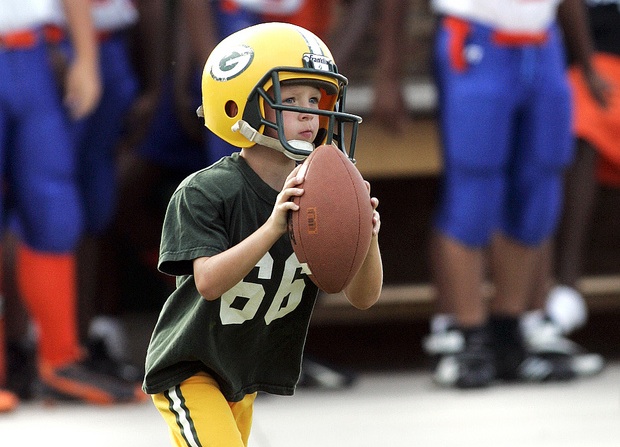Football Freakonomics: Born or Made?
The following is a cross-post from NFL.com, where we’ve recently launched a Football Freakonomics project.
There are a lot of things that need to go right for any given person to succeed in the NFL. We know all the stories about bad breaks, freak injuries, and mismatched coaches. On the flipside, we know how much hard work, discipline, and even luck go into a successful career.
In this installment of Football Freakonomics, we take a step back to ask the most basic question: are great players born or are they made? In other words, how much does raw talent matter?
It is of course an impossible question to fully answer. Maybe someday scientists will be allowed to run the kind of experiments that yield an answer. How would that work? They’d take 10,000 boys, measure their athletic abilities, and then evenly divide the boys into two groups. Over the course of many years, Group A would play football but not be required (or even allowed) to work very hard. Group B would play football but also be pushed to the max in training. Then, when the boys got to be NFL age, you’d see how the most “talented” kids from Group A compared to the less “talented” kids from Group B, and vice versa. In that way, you’d begin to get a sense of how much talent truly matters.
Fortunately, scientists aren’t (yet) allowed to run such experiments.
So we poke around the existing data and try our best to figure things out. By now a lot of people are familiar with the “10,000-hour rule,” the idea that no one gets excellent at anything unless they put in roughly 10,000 hours of “deliberate practice,” which we first wrote about back in 2006. It indeed presents a compelling argument: a growing body of research suggests that the elites in any field, whether it’s surgery, music, or sports, are not necessarily the people who were most “talented” at a young age, but rather the ones who wound up working the hardest over many years.
Makes sense, doesn’t it? This explanation also appeals to our moral sense: it’s only fair that the people who work hardest have the best chance of succeeding. And you can see time and again in the NFL that the most “talented” guys – the ones who outshine everyone in strength and speed at the Combine, for instance (see details in the graphic here) – aren’t necessarily the guys who succeed in the long run.
But there’s also a strong counter-argument in the NFL to be made for raw talent. Consider this fact: of the roughly 1,900 players on NFL rosters this season, 20 of them have fathers who also played in the NFL, or about 1 percent. That doesn’t sound like much, does it? But there are more than 20 million men in the U.S. of NFL age – and only 1,900 of them are in the NFL! That’s one guy for every 11,000 people in that age range – or about 1 1/1000th of a percent. How do you like those odds?
So while it’d be foolish to argue that hard work and determination and coaching don’t help to make great players great, it’d be just as foolish to ignore the genetic evidence in front of us. It may also be that the traits that contribute to excellence in various fields (computer science, medicine, the arts) are less hereditable than the traits that are important in sports. One obvious factor is size, which is strongly hereditable.
So yes, we should respect and honor the back-breaking work and diligence that every NFL player has shown. But we shouldn’t deny the edge that genes can provide. In other words: if someone offers you a bet that there’ll be an NFL quarterback named Manning in the 2030’s, you might want to take the bet.


Comments